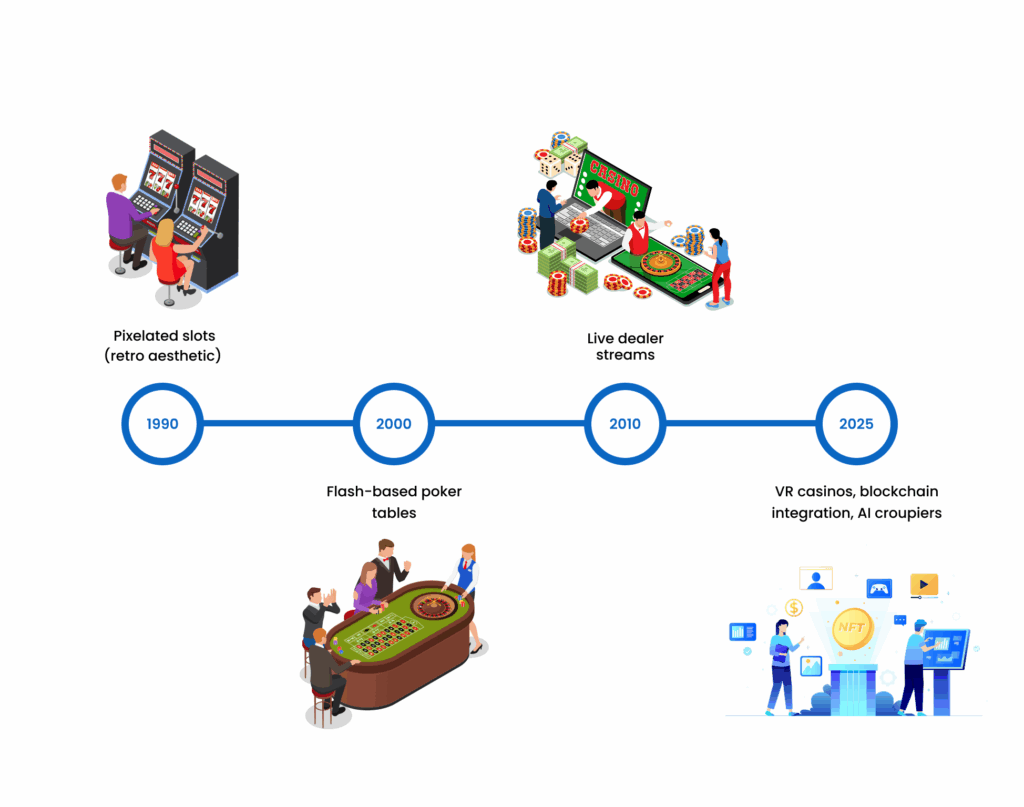How to Build the Ultimate Online Casino Experience from Scratch

The global market for online gambling is expected to reach $153.57 billion by 2030, growing at a compound annual growth rate (CAGR) of 11.7% between 2023 and 2030. The industry is rapidly expanding. Continuous smartphone and internet adoption, easy access to online casino gambling platforms, and the rise of freemium online gaming models are some of the causes driving this growth. (Src)
From poker and roulette to slots and live dealer video games, the virtual casino industry has developed into complex ecosystems built on blockchain connections, real-time multiplayer engines, AI-driven customization, and even VR/AR experiences. There are fewer barriers to access than ever before as legalization spreads over many regions.
The increase in demand is opening doors for investors, marketers, and developers to make their claim in a lucrative business. Enhancing the gaming experience in online casinos is quickly becoming one of the most advantageous and challenging areas of technology, where invention meets amusement and code meets threat.
What is Online Casino Game Development?
The art and science of developing digital gambling experiences that mimic the excitement of a physical casino, but with the additional wonder of contemporary technology, is known as online casino game development. Creating settings that combine psychology, design, real-time interaction, and financial logic is the goal of this kind of game creation, which includes anything from slick, fast slot machines to completely immersive multiplayer poker tables and live dealer games.
Online casino games are designed with a totally distinct twin purpose: entertainment and monetization. This is in contrast to traditional sport development, where success is frequently evaluated in terms of player retention and narrative depth. In this case, algorithms that ensure fairness, unpredictability, and adherence to stringent regulations are behind every spin, shuffle, and roll in addition to appealing graphics and gameplay.
The development method combines intricate backend infrastructures with traditional game mechanisms. Developers are required to provide safe payment systems, include real-time analytics, adhere to regional compliance regulations, and provide seamless cross-platform functionality. Online casino game development is obviously in a class by itself when you include gamification elements, loyalty plans, and multiplayer options.
Nevertheless, it shares the same core DNA as any excellent recreation—creativity, engagement, and player experience—despite its complexity. The stakes contain the real difference. Not only do developers create games in the online casino industry, but they also create ecosystems where real money moves, customer trust is crucial, and innovation may instantly impact revenue in real time.
Market Landscape & Trends
The world of online casino gambling in 2025 is completely different from what it was ten years ago. What began as simple web games has evolved into a rapidly evolving, technologically advanced company where player management, immersive reports, and innovation are paramount. Today's developers are creating virtual playgrounds rather than just games.

Now, mobile-first layouts are the most popular. As players spend more time on their phones than ever before, games are being designed to load instantly, interact fluidly, and run optimally on all platforms. A game is unlikely to survive if it doesn't perform well on cellular devices.
People's experiences at online casinos have been transformed by live provider games. Digital gambling is given a human touch by these live-streamed video games. The ability for players to engage with live hosts creates a delicious and sociable atmosphere that connects virtual and real-world international casinos.
Today, cryptocurrency is not a new idea; it is already well recognized. Blockchain-based platforms offer provably honest mechanisms, more transparency, and quicker rewards than traditional systems. With unique in-recreation items and customized prizes, NFTs are increasingly becoming popular, providing players with a sense of ownership.
The metaverse is rapidly becoming more and more popular. Avatar-driven gaming, immersive soundtracks, and virtual reality casinos are hardly science fiction anymore. Platforms are testing completely virtual worlds where users may interact with one another, stroll the casino floor, and play live tables from the comfort of their own homes.
A few companies are already leading the way. Stake.com has achieved tremendous success through influencer-driven marketing and a crypto-first strategy. With its sophisticated, scalable technology, Evolution Gaming is the industry leader in live casinos. Independent developers, meanwhile, are carving out markets with unique, imaginative experiences that stand out from the competition.
Types of Online Casino Games to Develop
Variety is essential when it comes to creating games for online casinos. Every kind of game appeals to different player tastes, target audiences, and geographic markets. The most popular game categories that developers should take into account, regardless of whether they are creating for high rollers or casual gamers, are broken down here:
1. Slot Games
Slots are still the unchallenged leader in online casinos because they are quick, dazzling, and incredibly adjustable. Developers may try out sponsored material, progressive jackpots, and themes that appeal to certain demographics in everything from traditional 3-reel games to intricate multi-line video slots with extra features. Incorporate cascading reels, multipliers, and dynamic animations to increase player involvement.
2. Table Games (Poker, Roulette, Blackjack, etc.)
These timeless masterpieces are still quite popular. Table games combine comfort and strategy, offering players amusement and difficulty. The areas of expertise for contemporary development include facet bets, multiplayer functionality, and fluid user interfaces. Variable difficulty levels and AI-driven opponents keep solitary players interested as well.
3. Bingo & Keno
These lottery-style games, which are well-liked in both Western and Asian markets, are easy to play yet offer plenty of possibilities for interaction. Stickiness and retention are increased by including social elements like chat, community objectives, and bonus rounds.
4. Scratch Cards
Scratch card games are low effort, high reward games that provide immediate satisfaction. They might be seasonal or themed and are excellent for audiences that are mobile-first. Think about rapid winnings, eye-catching graphics, and entertaining animations to make every "scratch" seem worthwhile.
5. Arcade-style Games
Skill-based components like timing, reflexes, or aim are included in arcade-style casino games, a recent trend that blurs the boundaries between gambling and regular gaming. These attract younger viewers and provide opportunities for eSports-style competition and gamified betting.
6. Live Dealer Games
These serve as the foundation for the engaging casino experience. Professional studios transmit live dealer games including roulette, baccarat, and blackjack in real time, fusing the ease of technology with the human factor. The experience is improved by features like social engagement, side bets, and multi-angle views.
7. Virtual Sports Betting
Using realistic animations and RNGs, this simulation-based genre mimics actual sporting events. The most popular choices are virtual basketball, football, and horse racing. Even during off-seasons, these games maintain player interest due to their steady availability and quick outcomes.
8. Crash Games & Provably Fair Games (Crypto-focused)
Players in crash games (like "Aviator") pay out before a multiplier crashes, making them popular in the cryptocurrency gambling industry. Provably fair algorithms, a crucial trust-building mechanism for blockchain-based systems, are frequently the foundation of these quick, addicting games.
9. Social Casino Games
Social casino games are designed to encourage interaction rather than direct betting, and they make money via in-app purchases and virtual currency. With social feeds, leaderboards, and gifting capabilities, they frequently imitate actual casino games. Perfect for platforms aimed toward people interested in casual gaming, smartphone applications, or Facebook.
Step-by-Step Online Casino Game Development Process
Developing an online casino game is a multi-phase process that blends creativity, strategy, and technology to provide a safe and entertaining product. It's not simply about writing code and releasing eye-catching images. From concept to launch, the entire development process looks like this.
Phase 1: Ideation & Planning
It all begins with a clear vision. Developers and stakeholders start by learning about the audience, including what makes them happy, what games they play, and what encourages them to come back. Here's where market segmentation and user personas are useful.
The team then develops a game design, coordinating gameplay concepts with platform objectives, legal requirements, and revenue mechanisms. In order to find feature possibilities, market gaps, and insights from the best-performing casino games, a thorough competitive analysis is carried out all at once. This stage lays a solid basis for everything that comes after.
Phase 2: Game Design
Now that the concept has been verified, the game begins to take shape. The rules and game mechanics are created by designers to be both enjoyable and in line. This includes developing UI/UX wireframes, storyboarding gameplay scenes, and imagining how players will engage with the game from start to finish.
After that, sound designers add immersive layers with effects and background music that heighten tension, reward, and satisfaction, while art teams bring visual elements—icons, characters, themes, and environments—to life. Here, the game's "feel" is created by combining practical design with visual storytelling.
Phase 3: Technical Development
This is where concepts turn into reality. Developers select a tech stack based on the needs of the game, such as Web3 tools for crypto integration, Unity or Unreal for intricate 3D interactions, or HTML5 for browser compatibility.
Backend and frontend development work together; the backend provides safe user data, real-time logic, and fluid gameplay, while the frontend manages graphics and interaction.
Implemented to guarantee equity, RNGs (Random Number Generators) are frequently validated by outside laboratories, particularly in regulated markets. Blockchain integration can support provably fair systems, NFT assets, or decentralized transactions if it is aimed at tech-savvy customers; nevertheless, this step is still optional and market-specific.
Phase 4: Testing & QA
The game is put through extensive testing before release. Functional QA ensures that everything, including gaming logic and user interface interactions, functions as intended. Security testing shields operators and gamers from fraud, exploitation, and data breaches. During the busiest game hours, load testing makes sure that performance endures under heavy user traffic.
RNGs' genuine randomness and fairness are confirmed, frequently via certification tools or simulation runs. Compliance testing, which covers anything from data protection procedures to responsible gaming measures, guarantees that the game satisfies regulatory standards for the markets it will service.
Phase 5: Launch & Deployment
It's ready to launch once everything has been finalized and approved. The game transitions between staging and production settings, with deployment plans customized for on-premises servers (for greater control, frequently in regulated areas) or cloud infrastructure (for scalability).
Also, LiveOps tools are configured to handle continuous updates, analytics, support, and user involvement. The first release is only the start; to keep the player population interested and involved, developers keep an eye on user behavior, fix issues, improve functionality, and release new material after it goes live.

Technology Stack for Online Casino Game Development
To create a successful online casino, you need a strong and well-integrated technology stack that prioritizes scalability, performance, and safety. The target audience, platform, and type of amusement all influence how much technology is desired.
Python, Java, and C are among the languages used by developers for backend enhancement and other performance-critical tasks. For cross-platform and browser-based video games, frontend interfaces typically use HTML5 and JavaScript to guarantee responsive and fluid gameplay.
The foundation of game engines is the creation of mechanics and graphics. Unreal Engine excels at high-fidelity 3D visuals, while Phaser is a lightweight engine perfect for 2D games and quick web deployment. Unity is well-known for its cross-platform support and extensive plugin library.
Frameworks like Node.Js, Django, or Spring Boot handle transactions, user data, and real-time interactions on the server side. These are used in conjunction with scalable databases such as PostgreSQL, MySQL, or MongoDB to store user profiles, histories, and gaming logs.
Regarding SSL encryption, firewalls, secure payment methods, anti-fraud equipment, DDoS protection, and multi-layer authentication, security is of utmost importance. Staying ahead of risks is made easier with regular testing.
This tech stack works together to provide dependable, equitable, and entertaining casino games that adapt to player demand and provide simple narratives on a variety of platforms.
Legal and Regulatory Requirements
Creativity and technology alone are insufficient when developing an online casino; compliance is as important. Strict legal requirements that differ by nation and occasionally by state must be met by every game. Getting this right keeps you lawfully in business, safeguards your platform, and fosters confidence.
The first step is licensing. Different advantages are provided by countries such as the Isle of Man, Malta, and Curacao. Curacao is quick and inexpensive, making it ideal for new businesses. Malta is well-known for its robust player protections and is regarded in the EU. Although more stringent, the Isle of Man attracts elite operators seeking legitimacy and improved financial access. A license not only proves your legality but also your legitimacy.
In order to identify users and identify fraudulent activity, platforms also need to incorporate systems such as KYC (Know Your Customer) and AML (Anti-Money Laundering). Without adding to the player's workload, these technologies aid in ensuring transparent and safe operations.
Gambling responsibly is also important. Tools that improve player well-being and satisfy regulatory requirements include deposit restrictions, time tracking, and self-exclusion. Player faith in sites that provide more than simply entertainment is growing.
Furthermore, developers must use geo-blocking and age checks to limit access in cases where games are prohibited or users are not of legal age. Real-time location monitoring, identity verification, and safe third-party integrations are all part of this, and they're all made to run smoothly in the background.
Keeping up with regulations is ultimately about gaining credibility, growing lawfully, and creating a reputable, long-lasting platform—not just about avoiding penalties.
Monetization Strategies
The platform, audience, and legal environment all affect how much money you may make from an online casino game. The correct model is necessary for long-term revenue since different models work best with different setups.
- Social and freemium games frequently use in-app purchases, where users can purchase chips, boosters, or coins to prolong gameplay or unlock benefits. This keeps the core game free while promoting spending.
- By providing customers with ad-free access, VIP perks, or daily bonuses, subscription models generate recurring revenue. It's excellent for establishing dependable revenue and loyalty.
- In casual games, affiliate marketing and ads perform best. Instead of directly incorporating gaming, links to real-money casinos or sponsored advertisements might provide passive income networks.
- Real money as well as pay-to-play Online casinos with licenses rely heavily on betting. The site takes a cut of the real money gambled by players. Although this strategy yields large rewards, complete legal compliance is necessary.
- Crypto and NFT Monetization opens up new options for more technologically advanced platforms, such as token economies, NFT-based rewards, and cryptocurrency betting. Blockchain-savvy customers seeking transparency and digital ownership will find this appealing.
Depending on your game's objectives, user base, and legal constraints, you can choose the best combination of these models.
Cost Breakdown of Online Casino Game Development
Launching an online casino game involves more than simply creation; it involves a significant investment in a number of areas, each of which has an impact on your budget depending on the game's features, scope, and location.
- The largest expense is game development, which includes front-end/back-end code, engine integration, design, and animation. Complexity is important; live features, multiplayer, and 3D graphics all increase cost.
- Legal fees and licensing follow. Cost is impacted by selecting jurisdiction like Malta/Isle of Man (high credibility) or Curacao (cheap). Annual license renewals, compliance documentation, and legal counsel can add money.
- Software and infrastructure, such as databases, cloud hosting, analytics, and cybersecurity, guarantee the seamless and safe operation of your game. These are the cornerstones of scale and stability.
- Real-money games require third-party integrations like payment systems, RNGs, and KYC/AML tools. They help comply with regulatory requirements and enhance functionality, but they frequently have ongoing costs.
- Getting noticed requires marketing and launch activities. Consider affiliate networks, influencer partnerships, paid advertisements, and app store optimization—all essential for increasing user traction.
- Maintaining players' interest and the long-term viability of your platform depends on ongoing operations, including LiveOps, customer service, upgrades, and maintenance.
Building a successful casino game ultimately involves more than just production; it involves investing in a complete ecosystem that promotes player retention, growth, and compliance.
Key Challenges and How to Overcome Them
It's harder than ever to stand out in the highly competitive online casino market. Providing distinctive gameplay, a flawless user experience, and powerful branding are essential for success. Putting underserved areas or specialty markets first can also generate early traction.
Regulatory obstacles are a persistent problem, particularly for international platforms. Working with knowledgeable legal counsel, selecting the appropriate licensing jurisdiction early on, and incorporating compliance into your product from the start are the answers.
Problems with fraud and payment processing can undermine customer confidence and company operations. It is crucial to establish multi-layered fraud detection systems and collaborate with trustworthy, gaming-compliant payment suppliers.
Data security cannot be compromised. Strong encryption, frequent security audits, and adherence to global data protection regulations like GDPR are necessary for safeguarding user information and financial data.
Keeping players sometimes is more challenging than getting them. Prioritize individualized experiences, loyalty plans, dynamic rewards, and frequent content changes to keep players interested.
In our Ultimate Guide to iGaming Software, explore the newest developments, professional tactics, and insider information. This is your one-stop guide, regardless of whether you're starting from zero or improving your current setup.
Post-Launch Operations & Scaling
Starting a game is only the first step; maintaining success will depend on how well you maintain and expand your player base.
Community management and customer service are important. Building trust and increasing player retention requires a responsive support staff and active participation on forums, social media, and in-game chat.
The game is kept interesting with frequent updates. To prevent boredom and retain gamers, new content should be added, features should be improved, and player feedback should be addressed.
Bonuses, VIP tiers, and customized awards are examples of loyalty programs that work well for promoting recurring play and fostering sustained engagement.
Support for multiple languages and currencies becomes crucial as you grow. This gives international gamers a seamless experience and opens the door to worldwide markets.
At the very least, gamers can access the game however they like thanks to cross-platform availability on desktop, mobile, and even smart TVs. Given the importance of mobile, cross-platform compatibility is important for reaching your whole audience.
Marketing & Growth Strategy

Your online casino game needs a detailed advertising strategy to drive visitors and guarantee steady growth. To improve exposure and rankings, start with SEO (Search Engine Optimization) and ASO (App Store Optimization). This will make it easier for players to find your game in app stores or online. By using search engines or social media platforms to target highly intended visitors, PPC (Pay-Per-Click) advertisements can support these initiatives.
In the gambling industry, influencer and affiliate marketing have grown to be effective strategies. You can reach a wider audience by collaborating with influencers in the gaming or lifestyle categories, and you can increase your reach by using affiliates to drive traffic through commission-based incentives.
Social media marketing is crucial for attracting and retaining players. Social media sites like Facebook, Instagram, and Twitter are ideal for promoting brands, holding competitions, and providing thrilling news to keep players interested and excited.
Push alerts and retargeting assist in bringing back players who may have strayed, keeping them interested. Restoring interest and encouraging regular play can be achieved through personalized reminders, exclusive deals, or new game features.
The last step in improving the performance of your game is tracking user behavior. You may enhance the overall player experience, modify monetization tactics, and modify features to optimize retention and income by examining player interactions, preferences, and in-game activities.
Future-Proofing Your Casino Game Business
It's critical to future-proof your business if you want to survive and prosper in the always changing world of online casinos. This involves being flexible and making sure your platform can grow and develop with you.
It is critical to adjust to regulatory changes. There are strict regulations governing the gaming business, and these laws are often changing. It takes ongoing observation, operational adaptability, and a solid rapport with legal professionals to swiftly adapt to new regulations if you want to stay ahead of these changes.
Scaling your infrastructure is crucial to fulfill demand as your user base increases. Load balancing, dynamic server management, and cloud-based solutions guarantee seamless gameplay even when traffic increases or the player base grows.
Gaming and business operations can be significantly improved by integrating AI and machine learning. AI has the potential to improve productivity and expedite procedures in a variety of fields, including chatbots for smarter customer service, individualized gaming experiences, and marketing analytics. Higher engagement and retention can be achieved by using machine learning models to forecast user behavior and adjust game features.
Finally, Web3 integrations, AR/VR, and the Metaverse are the modern in online gaming. Integrating blockchain technology and virtual worlds can give players a futuristic and immersive experience as these technologies gain popularity. Providing virtual reality casinos or using Web3 for decentralized gambling could distinguish your platform as a pioneer in the field.
How to Choose the Right Development Partner
Your resources and level of experience will determine whether to outsource or create internally. Although in-house teams provide the project more control, outsourcing offers flexibility and access to specialized talents.
A solid portfolio, established experience, and knowledge of gaming technologies are essential variables when choosing a casino game development business. The ideal partner should be aware of the complexities of the gambling sector and adhere to legal requirements.
Think about the cost-quality ratio; while going with the least expensive option could save money, going overboard could blow your budget. To guarantee long-term success, look for a partner who provides excellent services at a reasonable cost.
Final Thoughts
For individuals who are willing to adjust, the fast changing online casino game development market offers a multitude of chances. It does, however, necessitate careful preparation, knowledge of legal and regulatory standards, and a progressive attitude toward technology. Success doesn't come quickly, but you may guarantee long-term development and profitability by concentrating on the appropriate tactics and continuously changing with the market.
Key Takeaways:
- Research and Planning: Effective development is built on a solid understanding of your target market and competitors.
- Regulatory Compliance: Make sure you're using appropriate gaming techniques and following licensing regulations.
- Technology: Use cutting-edge technology, such as blockchain, AI, and AR/VR, to differentiate yourself in the competitive market.
- Marketing & Growth: For your game to reach its full potential, develop a solid plan that incorporates SEO, influencer marketing, and retention tactics.
Checklist to Get Started:
- Describe your target audience and game concept.
- The best development partner with real-money gaming experience should be chosen.
- Get the licenses required by your jurisdiction.
- Create and include secure RNGs and payment mechanisms.
- From the beginning, plan your growth and marketing strategy.
- Launch, track player input, and make constant improvements.
You may create a profitable and effective online casino game by maintaining attention on these components.
FAQs
How long does it take to develop an online casino game?
For more complex initiatives, including live dealer games or incorporating blockchain functionality, the timeframe may be nine to twelve months or more. Finding a balance between creativity and a sound development plan is essential for success.
Can I launch a crypto-only casino?
However, as crypto casinos are subject to more difficult inspection in some countries, you must make sure that local rules are followed, particularly those pertaining to AML (Anti-Money Laundering) and KYC (Know Your Customer) requirements.
What’s the ROI on an online casino game?
Some games may achieve a positive return on investment (ROI) in the first year if they are properly managed, while others could take longer. Over time, a strong, data-driven strategy for player engagement and frequent updates may greatly increase revenue.
Do I need a license to develop vs. operate an online casino?
While creating the game is an independent procedure, obtaining a license is required to adhere to legal and regulatory regulations once you start real-money betting and operations.


